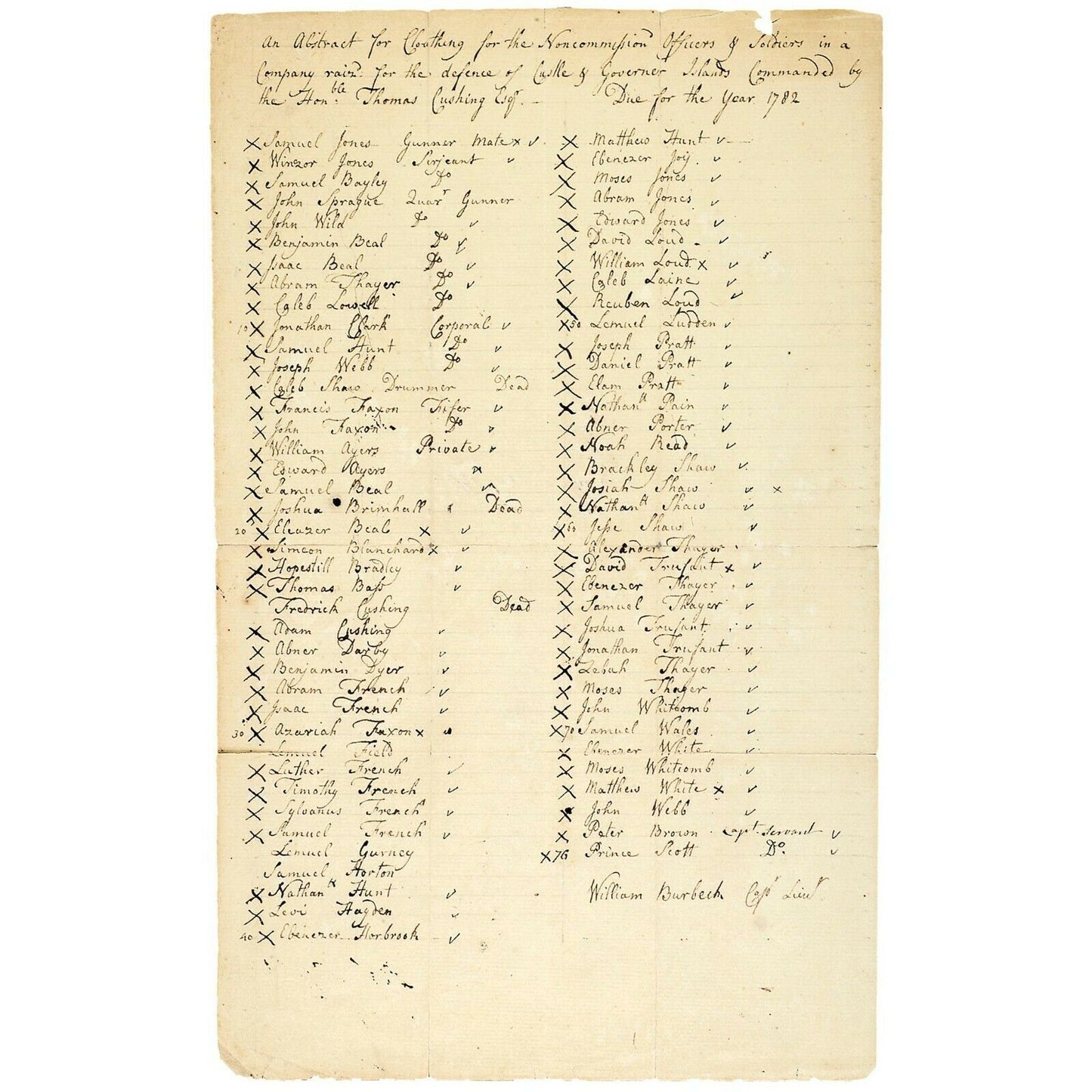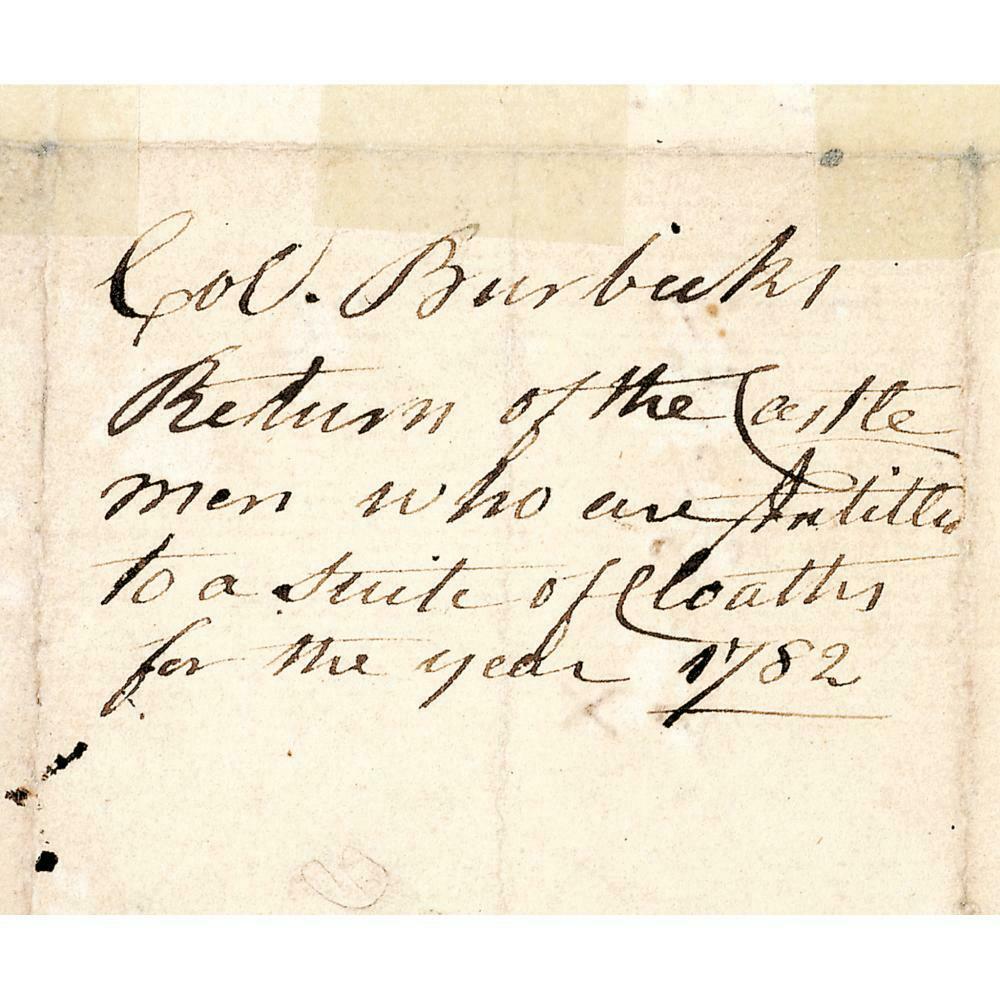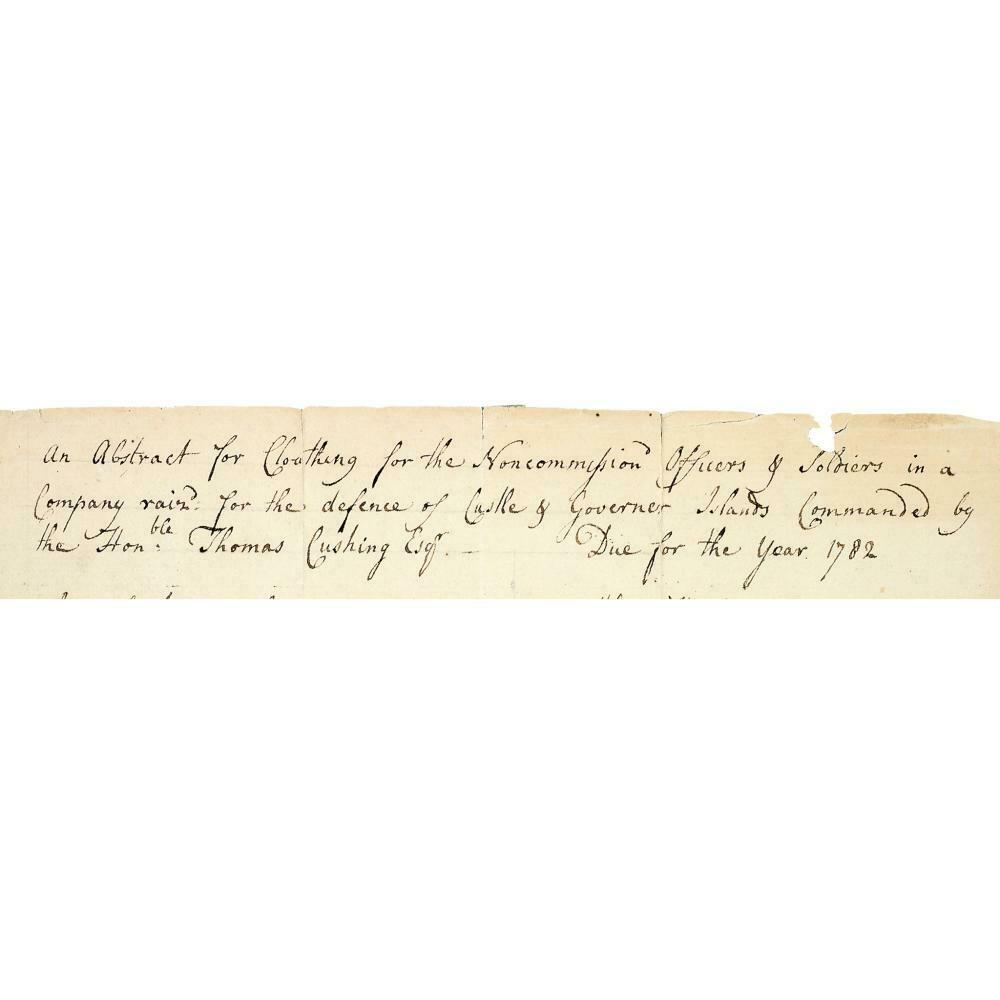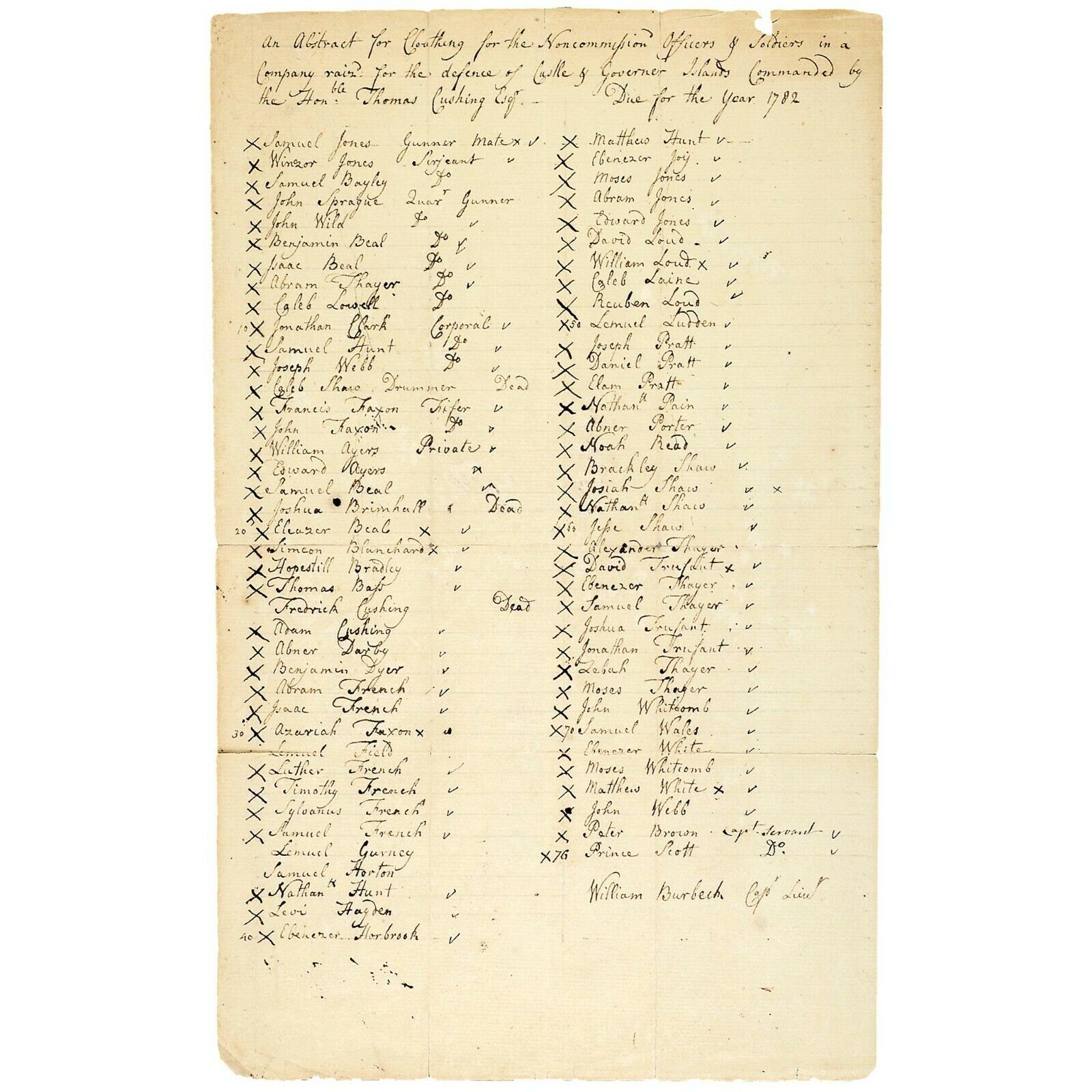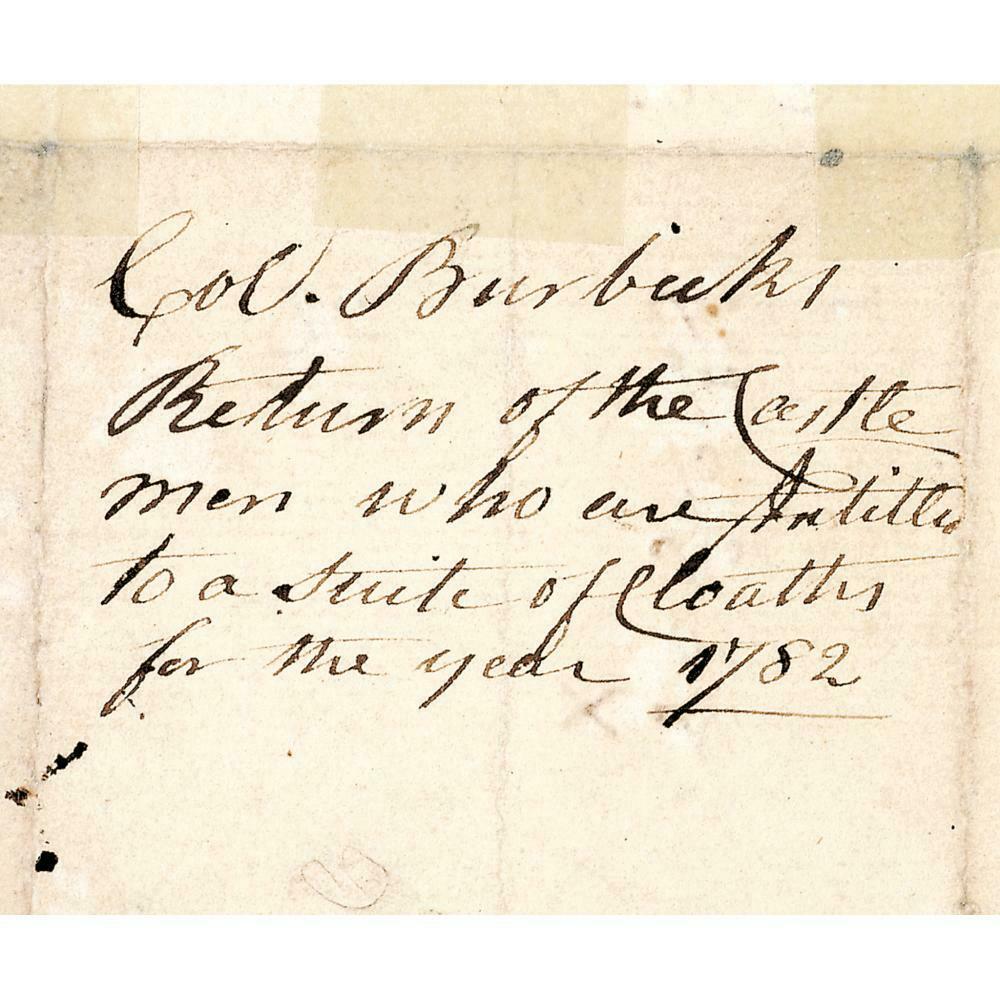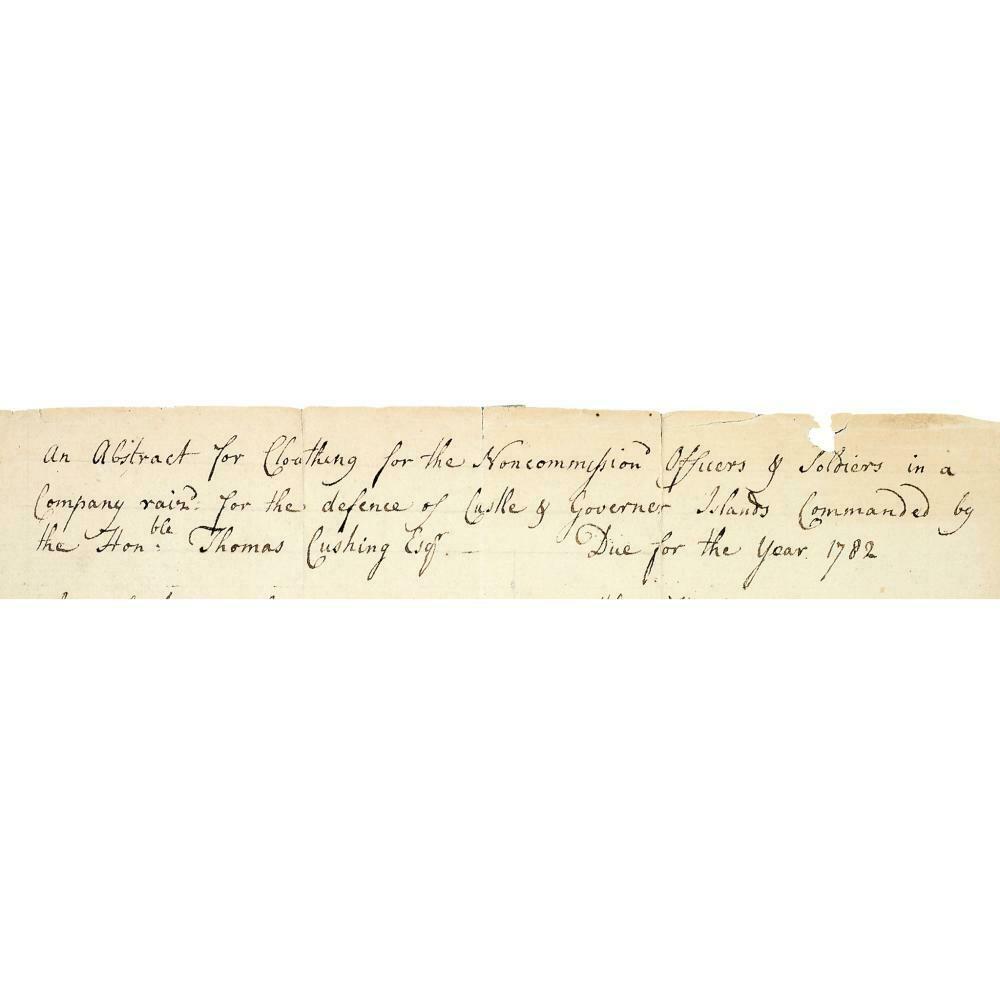Wondrous-Things.com (813) 409-4683
1782 Listing of Soldiers in Defense of Castle & Governor's Island Required Clothing Revolutionary War Boston, Mass.
1782 Listing of Soldiers in Defense of Castle & Governor's Island Required Clothing Revolutionary War Boston, Mass.
Couldn't load pickup availability
1782 Listing of Soldiers in Defense of Castle & Governor's Island Required Clothing Revolutionary War Boston, Mass.
1782 Revolutionary War Manuscript Document Signed, "William Burbeck Comp. Lieut.", Titled: "An Abstract for Cloathing (sic) for the Noncommission Officers & Soldiers in a Company raised for the defence of Castle & Governor Ilands Commanded by the Honlbe Thomas Cushing Esqr. Due for the year 1782," Very Fine.
Size: Document measures 12 1/2 inches in height, 7 1/2 inches wide.
Docket notation is boldly written (including spelling errors) on the blank reverse reads, in full: "Col. Burbeck's Return of the Castle men who are Intittled to a Suite of Cloaths for the year 1782". This Revolutionary War Handwritten Manuscript document dated 1782, being an abstract of Massachusetts Revolutionary War non-commissioned officers and men who were raised for the defense of both Castle and Governors Island, under the command of Thomas Cushing. Thomas Cushing III (1725-1788), during the American Revolutionary War was a Commissary responsible for provisioning the military, a position he used to enrich his family merchant business. He was elected the State's first Lieutenant Governor in 1780. Listed are the names, ranks, and functions of 76 men, a few of whom are listed as being dead. It is written on period laid paper that has a "W S" watermark. This historic document is signed by William Burbeck (1716-1785), who was the architect of many of the early buildings in downtown Colonial Boston, also responsible for many of the fortifications in Colonial Era Boston. Burbeck rose to the rank of Colonel in the Massachusetts Militia, mostly affiliated with Artillery units. An important, rare and historic Massachusetts Revolutionary War Document as Islands were instrumental in setting up crucial artillery units used during the Battle of Bunker Hill.
William Burbeck (1716-1785). Architect, Engineer and Artisan, responsible for many of the early buildings and fortifications in Colonial Era Boston. He rose to the rank of Colonel in the Massachusetts Militia, mostly affiliated with artillery units.
Thomas Cushing III (March 24, 1725 - February 28, 1788) was an American lawyer, merchant, and statesman from Boston, Massachusetts. Active in Boston politics, he represented the city in the provincial assembly from 1761 to its dissolution in 1774, serving as the lower house's speaker for most of those years. Because of his role as speaker, his signature was affixed to many documents protesting British policies, leading officials in London to consider him a dangerous radical.
He engaged in extended communications with Benjamin Franklin who at times lobbied on behalf of the legislature's interests in London, seeking ways to reduce the rising tensions of the American Revolution.
Cushing represented Massachusetts in the First and Second Continental Congresses, but was voted out when he opposed independence. Despite this, he remained politically active after independence, continuing to serve in the state government.
During the American Revolutionary War he was a commissary responsible for provisioning the military, a position he used to enrich the family merchant business. He was elected the state's first Lieutenant Governor in 1780. Politically associated with fellow merchant and governor John Hancock, he remained lieutenant governor until his death in 1788, briefly serving as Acting Governor in 1785 between the resignation of Hancock and the election of James Bowdoin. Cushing continued to maintain a weak attitude toward independence through 1775, which cost him his seat in the Continental Congress in December 1775.
After a heated election campaign Cushing was defeated by Elbridge Gerry, who was committed to independence. The loss, which decisively handed pro-independence forces a majority in the Massachusetts delegation, propelled Cushing firmly into Hancock's camp. Cushing continued to oppose independence upon his return to Massachusetts, orchestrating delays in the polling process by which the state formally called for a "Declaration of Independence".
Hancock, then the president of the Continental Congress, rewarded Cushing's loyalty by securing for him the appointment as a commissioner of marine affairs. In this role Cushing oversaw the procurement of two 32-gun frigates for the Continental Navy. He was also appointed the Chief Commissary responsible for supplying Massachusetts troops, a post he held for several years. In 1780 he was appointed as one of the Chief Commissaries responsible for supplying the French troops at Newport, Rhode Island.
Cushing, in behavior that was similar to that of other merchants involved in military supply, used these positions to substantially enrich the family merchant business by granting it favorably priced supply contracts. He was also involved in regional conventions that attempted to stem the inflationary decline in value of the Continental dollar by setting wage and price controls; these attempts failed because states refused to implement convention recommendations.
In 1778 Cushing was involved in an unsuccessful attempt to create a new constitution for the state. This effort was rejected by the state's eligible voters for a variety of reason, although there continued to be calls from the towns demanding a new constitution. Cushing was not involved in the detailed drafting of the state constitution that was adopted in 1780. He was a charter member of the American Academy of Arts and Sciences (1780).
Castle Island is located just outside of Boston and was the stronghold keeping the British out of the harbor.
Governors Island in now mostly under the area of Log
Materials
Materials
Shipping & Returns
Shipping & Returns
Dimensions
Dimensions
Care Instructions
Care Instructions
